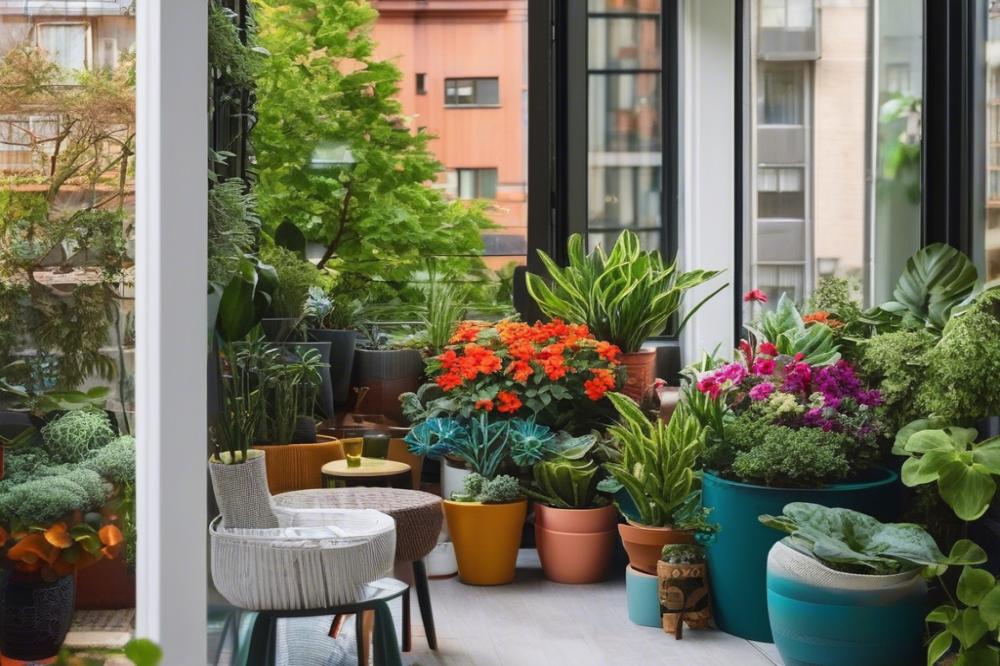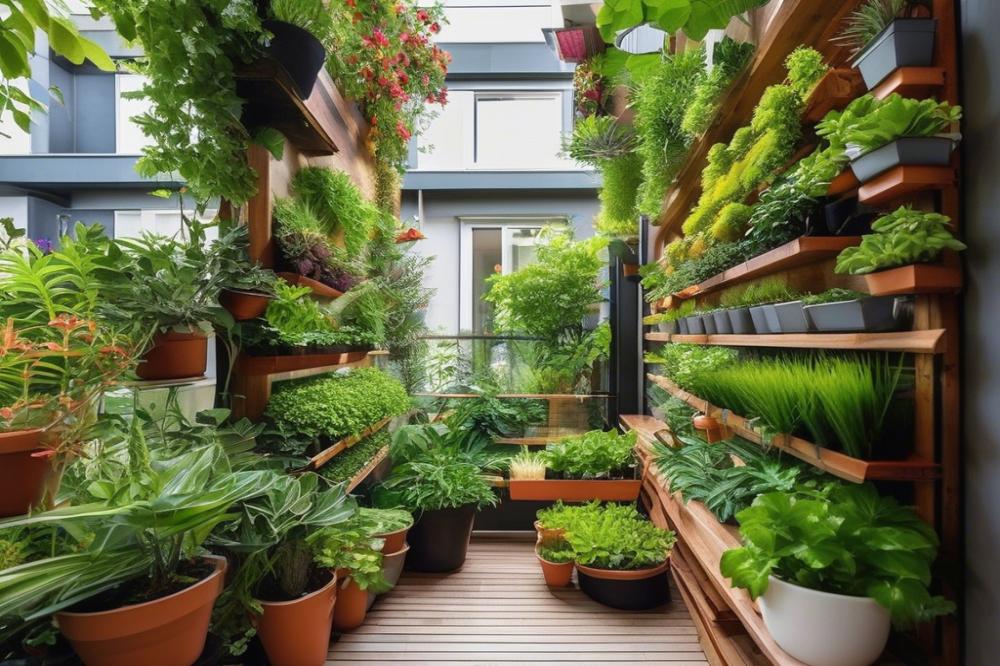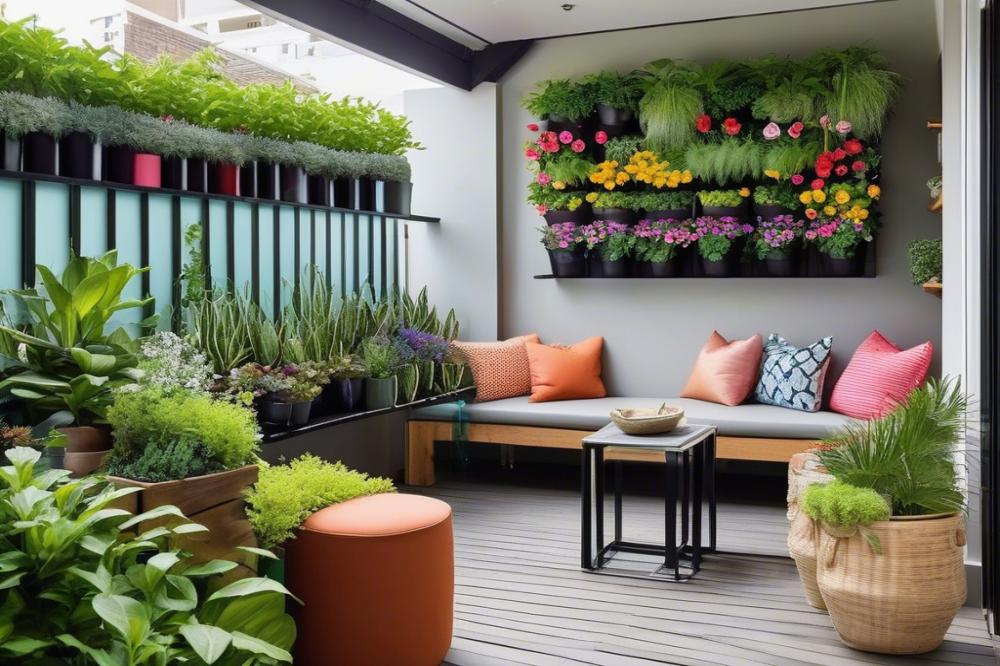Balcony gardening Hacks: Tips for Thriving Plants
Living in an urban environment often comes with limited space for gardens. Balcony gardening provides a fantastic solution for individuals looking to cultivate their green thumbs amidst concrete jungles. Not only does this method allow for the enjoyment of nature, but it also brings many benefits to city dwellers.
Nurturing container plants can be incredibly rewarding. They offer flexibility in how and where you grow your greenery. With the right plant selection, anyone can enjoy a diverse range of flowers, herbs, or vegetables. Imagine stepping out onto your balcony to see vibrant blooms or fresh basil ready for cooking. Such experiences bring joy and a sense of achievement in your small farming space.
urban gardening is more than just growing plants. It helps improve air quality and provides habitats for local wildlife. Container gardening can reduce stress levels and create a serene environment, making urban life more enjoyable. A simple pot of mint or a cascading plant can bring life to even the smallest balcony. Focus on soil quality and you’ll find that your plants thrive much better. Healthy soil is vital for plant health. Use organic composting methods to enrich your pots with nutrients.
Consider the importance of sunlight exposure in your gardening efforts. Different plants have unique light requirements. Understanding these needs ensures that your plants receive the correct amount of sunlight. Watering tips play a significant role in Plant Care as well. Every plant has its own watering cycle. Pay attention and adjust your routine based on the seasons.
Pest control can be a concern for indoor gardeners. Simple methods like introducing beneficial insects or using natural repellents can help protect your plants. Lastly, embracing vertical gardening methods can maximize your space. Hanging planters or wall-mounted systems can add flair while saving floor space. With the right gardening tools, your balcony can transform into a green haven.
Balcony Gardening Essentials
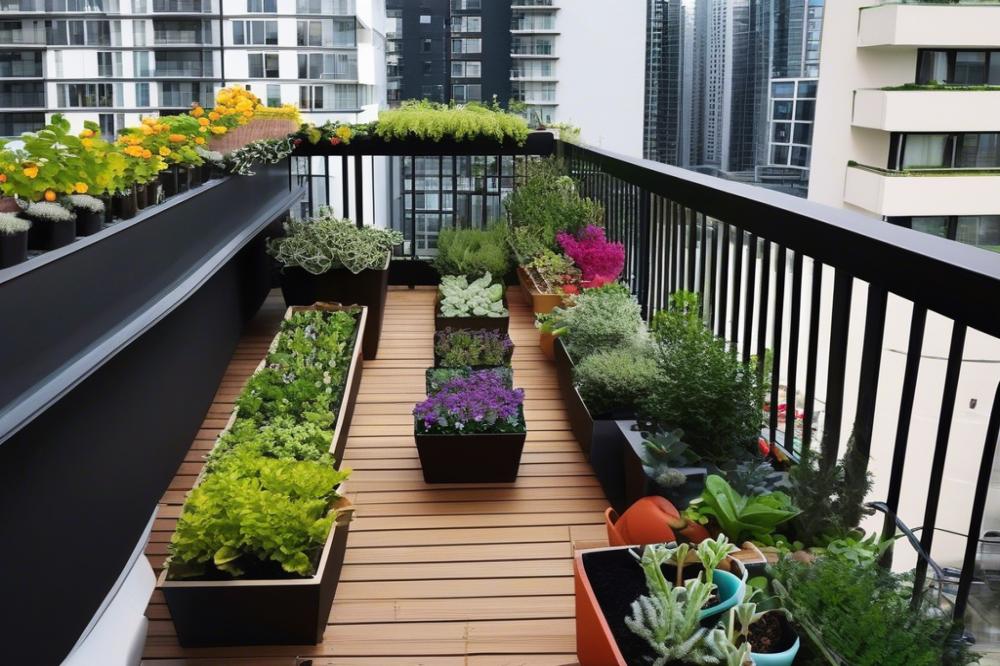

Balcony gardening is the practice of growing plants in small spaces, typically on balconies, patios, or terraces. It plays a crucial role in urban gardening, allowing city dwellers to enjoy nature despite limited space. The right plants can transform that small area into a lush green retreat. However, selecting the best container plants is vital for success.
Consider the types of plants that thrive in containers. Herbs like basil, thyme, and mint are perfect for small spaces. They don’t require much room and add fresh flavors to your meals. Flowers such as petunias, marigolds, and pansies can bring color to your balcony. Vegetables like cherry tomatoes and peppers also do well in pots. Remember that soil quality is essential. Good soil provides nutrients and helps retain moisture.
Sunlight exposure is another factor to weigh when choosing plants. Some plants need full sun, while others prefer partial shade. Knowing the available light on your balcony can guide your plant selection. Always check the sunlight patterns throughout the day. This can make or break your gardening efforts.
Watering tips are also important for maintaining healthy plants. Container plants tend to dry out faster than those in the ground. Daily checks are a good habit. If the top inch of soil feels dry, it’s time for a drink. Be mindful not to overwater, as this can lead to root rot.
Pest control is essential for thriving plants. Small pests, like aphids or spider mites, can wreak havoc in a few days. Regularly inspect your plants for any signs of trouble. If you spot pests, act quickly. Organic solutions, such as neem oil, can be effective without harming the environment.
Vertical gardening is gaining popularity, especially in urban settings. This technique maximizes space by allowing plants to grow upward. Wall-mounted planters or trellises can help create a mini-garden up high. This not only saves space but also adds visual interest.
Having the right gardening tools makes the process easier. Basic tools like a trowel, pruning shears, and watering can should be in every gardener’s toolkit. They help manage container plants effectively. Composting is another great tip. Creating your own compost can provide rich nutrients to your plants at little cost.
When considering your plant choices, think about your climate as well. Some plants thrive in heat, while others prefer cooler temperatures. Researching what grows best in your area can lead to better results.
Soil Quality for Container Plants
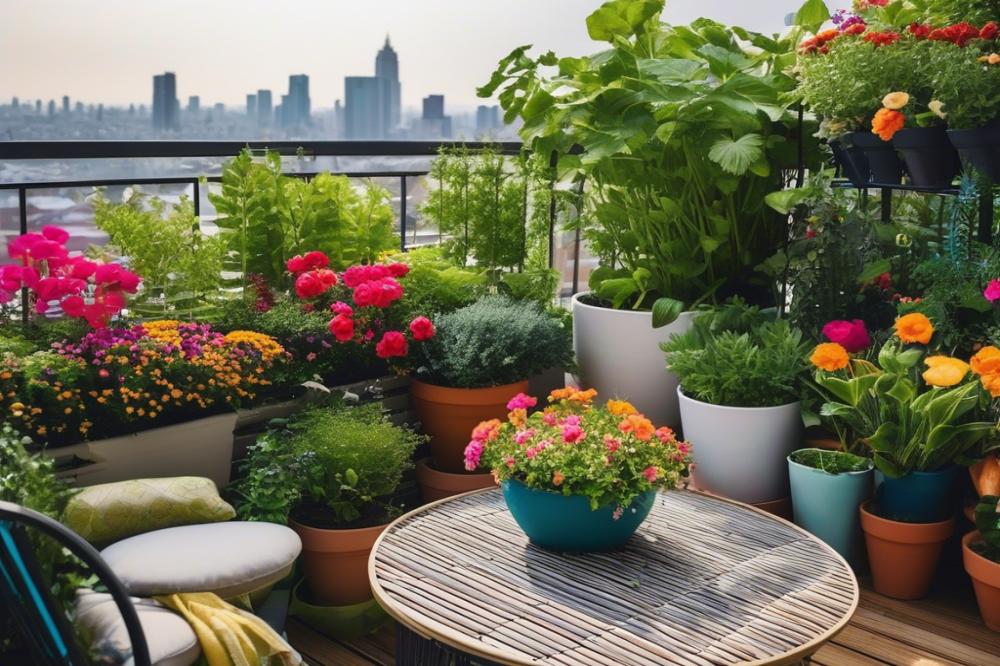

Selecting high-quality soil is crucial for the success of container plants. Poor soil can lead to stunted growth and unhealthy plants. The right mix provides essential nutrients and supports plant health. Using a dense or too lightweight soil can cause more problems than one might expect.
Begin with a well-draining potting mix. This type should include components like peat moss, vermiculite, and perlite. These ingredients help retain moisture while allowing excess water to escape. Always look for soil labeled specifically for container plants. Many garden centers offer mixes that cater to various plant types.
Drainage holes at the bottom of containers are non-negotiable. Water needs to flow freely to avoid root rot. If plant roots sit in water, the results can be disastrous. Consider using a layer of small stones or broken pottery at the base of pots for added drainage.
Improving soil quality can make a significant difference in your urban gardening journey. Incorporating organic matter like compost boosts the nutrient content of your mix. Compost acts as a fertilizer, promoting healthy growth and enriching soil life. Adding a handful of compost to the potting mix can enhance both texture and nutrients.
Additionally, keep sunlight exposure in mind. Plants thrive in different light conditions. Be sure to select a soil that supports the needs of the specific plants you choose. Some plants may require more water-retention, while others prefer a fast-draining mix. Understanding each plant’s requirements will help you make smarter soil choices.
Watering tips also play an integral role in maintaining soil quality. Overwatering can wash away nutrients, while underwatering can lead to dry, dead plants. Test the soil moisture before watering. Feel the top inch of the soil; if it’s dry, watering is necessary.
When it comes to pest control, healthy soil promotes healthy plants, making them less vulnerable to insects and diseases. Healthy, well-fed plants establish their root systems and grow stronger. You may need to use gardening tools for proper care, ensuring that each container plant receives just the right amount of attention.
Vertical gardening can also benefit from high-quality soil. Plants growing upward often need sturdy support along with solid, nutritious soil. Use a mix that can hold moisture adequately while still providing good drainage, especially for vertical setups.
Sunlight Exposure and Plant Selection
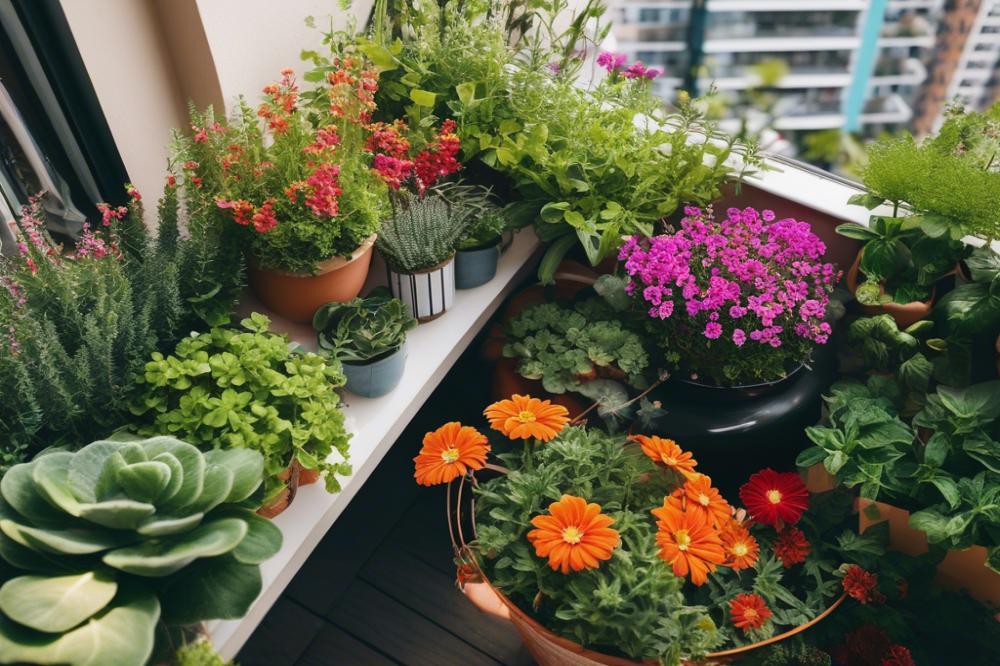

Assessing sunlight exposure on your balcony is a vital first step for successful urban gardening. Start by observing your space throughout the day. Take note of how many hours of direct sunlight your balcony receives. Some areas may bask in bright sunlight all day, while others may only get a few hours of light or none at all. Understanding these conditions will greatly influence your plant selection.
If your balcony gets plenty of sunlight, you have the option to choose sun-loving plants. Species like tomatoes, petunias, or basil thrive in full sun. They not only flourish but also add vibrant colors and delicious flavors to your gardening adventure. However, if you notice that your area is mostly shaded, don’t worry. Many delightful plants do well in low light, such as ferns, hostas, and certain types of ivy. These shade-tolerant varieties can bring life to your balcony, even without constant sunshine.
Consider the arrangement of your container plants too. Using vertical gardening techniques can maximize space on a limited balcony. Hanging pots and wall planters can cultivate an impressive display while allowing for proper sunlight exposure on each plant. Just like shopping, plant selection becomes easier when you know your needs. Explore various types of plants based on their lighting requirements, and you will create a thriving garden.
Soil quality plays an essential role in plant health as well. Ensure your soil has good drainage and is rich in nutrients. This will support your plant’s growth, regardless of sunlight conditions. It’s advisable to mix in compost to boost soil fertility, which could improve plant resilience against pests.
Watering tips also come into play with your chosen plants. Sun-loving varieties usually require more water, while shade-tolerant plants may need less. Keep a consistent schedule and adjust based on the weather. Noticing how the plants respond will guide you in this area.
Lastly, remember to monitor for pests. They’ll appear no matter whether plants bask in sunlight or reside in the shade. Having the right gardening tools on hand, such as pruning shears and pest control solutions, will make dealing with these challenges easier.
By choosing plants that align with your balcony’s sunlight exposure, you set the stage for a flourishing garden. Your understanding of these elements transforms your space into a vibrant oasis. With the right approach, every balcony has the potential to become a beautiful sanctuary with thriving life.
Watering Tips for Thriving Plants
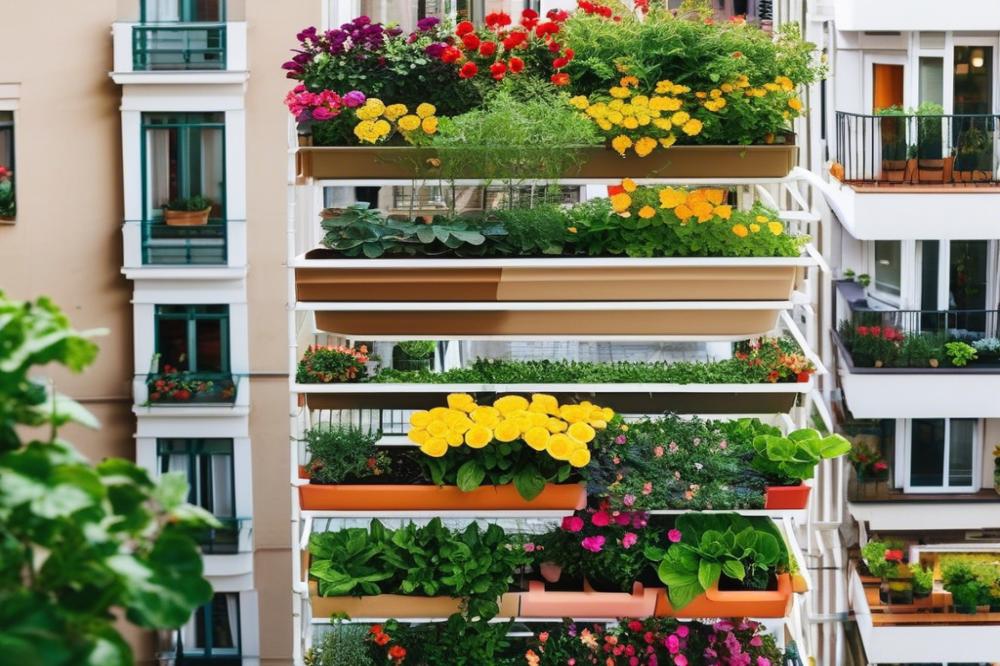

Watering techniques are crucial for maintaining a healthy urban garden. Each container plant has different needs, so getting it right is essential. Consider how often to water each type. Normally, plants in pots dry out faster than those in the ground. This means you might need to check them daily.
Look for signs that your plants need help. Yellow leaves often signal overwatering. If the soil looks soggy, hold off on the next watering. Conversely, dry and crispy leaves mean it’s time to give your plants a drink. Always be observant; your plants will tell you what they need.
Create a watering schedule to keep things organized. Water your container plants at the same time each day, if possible. Morning is ideal since it allows plants to absorb moisture before the heat of the day sets in. Adjust your routine based on sunlight exposure. Areas with more sun may require more frequent watering.
Soil quality also plays a role. Well-draining soil prevents water from sitting too long and helps avoid root rot. Add compost to improve aeration and moisture retention. This simple adjustment can make a big difference to your plants’ vitality.
Watering is just one part of successful gardening. Consider pest control methods as well. Healthy plants are less vulnerable to threats. Combine good watering habits with a few gardening tools to make the process smoother. You can create a thriving environment for your plants, even in limited spaces.
Vertical gardening is a fantastic option for balconies. It allows you to maximize space while ensuring plants receive adequate water. Drip watering systems or self-watering containers can help manage moisture levels. These methods minimize the chance of overwatering and free up some of your time.
Pest Control Strategies
Urban gardening can often lead to unexpected challenges, especially when it comes to pests. Common nuisances include aphids, spider mites, and whiteflies. These tiny pests can quickly infest container plants, leaving them weak and damaged. Fortunately, several organic methods can help keep these critters at bay.
One effective strategy is introducing beneficial insects, such as ladybugs or lacewings. These natural predators feast on common pests and can significantly reduce infestation levels. Additionally, neem oil is a great organic treatment. Spraying a diluted solution on your plants can deter pests without harming the environment. Soap sprays made from diluted dish soap can also smother unwanted insects.
Preventive measures are just as important as treatment. Start by selecting plants wisely. Some varieties are more resistant to pests, so choose wisely based on your local conditions. Soil quality plays a role too; healthy plants are less likely to attract unwanted visitors. Regularly inspect your plants for any signs of trouble. Early detection can make all the difference in controlling an outbreak.
Sunlight exposure is crucial for strong, resilient plants. Inadequate light can weaken them, making them more susceptible to pests. Always check your watering tips, as overwatering can create a perfect environment for pest problems. Ensuring good drainage in your containers is key. Proper airflow can also minimize pest presence, so don’t overcrowd your plants.
Vertical gardening is another tactic that creates more space for your plants while improving air circulation. This method not only enhances aesthetics but also reduces the chances of pests finding a home among your greens. Remember to keep your gardening tools clean as well. Dirty tools can transfer pests or diseases from one plant to another.
Lastly, composting can be beneficial. Compost provides nutrients, promoting healthy growth, which can help plants resist pests. By implementing these strategies, you can create a thriving balcony garden free from bothersome invaders.
Maximizing Space with Vertical Gardening
Living in a small space doesn’t mean you can’t enjoy a garden. Vertical gardening is an excellent solution for balcony enthusiasts with limited room. This method allows you to grow more plants without taking up precious floor space.
One of the main benefits of going vertical is that it maximizes your gardening area. By utilizing walls or railings, you create a lush green atmosphere. Container plants can be stacked or hung, leaving the ground free for other uses. This creates a cozy environment while still allowing for creativity in your planting.
When it comes to selecting vertical gardening tools, consider starting with wall planters, hanging baskets, or even repurposed items like pallets and shoe organizers. The right tools can really make a difference. Ensure that any containers you use have good drainage. Healthy soil quality is vital for your plants to thrive.
Plant selection is also essential. Choose species that will do well in your available sunlight exposure. Herbs like basil and mint are great for containers. Flowers such as nasturtiums offer beautiful colors. Do remember that each type of plant will have its own needs regarding watering tips and soil depth. Pay attention to these details to maximize growth.
Preventing pests is another important aspect of gardening. Keep a close eye on your plants. Regularly check for any signs of infestation. Using natural pest control methods can help keep your plants safe and healthy. You might also consider composting, which enriches the soil and can deter unwanted insects.
Adopting vertical gardening techniques not only beautifies your space but also provides a unique experience of urban gardening. Embrace your creativity and make the most out of your balcony by going green in the vertical direction!
Essential Gardening Tools for Balcony Gardens
When diving into urban gardening, having the right tools is crucial. A few basic items can make caring for container plants not only easier but also more enjoyable. Here’s a list of must-have gardening tools that will help you thrive in a limited space.
A good pair of pruning shears is vital. They allow you to trim your plants efficiently, promoting healthier growth and better sunlight exposure. Regular trimming helps shape plants and also encourages more blossoms or fruit.
Next, think about a quality watering can. Look for one with a long spout. This design allows for precise watering, especially in tight spaces. You’ll be able to reach plants even in the back of your balcony without spilling water everywhere.
Don’t overlook a sturdy trowel. A trowel is perfect for digging and moving soil. This tool makes it easier to change out soil when you need to boost soil quality. It’s also handy for planting new seedlings.
Consider investing in a soil moisture meter. Knowing when to water can be tricky. This tool takes the guesswork out of watering tips. It shows you exactly when your plants need hydration.
A comfortable kneeling pad could be a game changer. Spending time tending to plants can strain your knees. A soft pad makes it easy to work without discomfort. You’ll be able to enjoy vertical gardening activities longer.
Gardening gloves are essential too. They protect your hands from dirt, thorns, and pests. A good pair protects against scratches while you handle your plants. Keeping your hands safe lets you focus on plant selection.
Lastly, add some basic pest control products to your toolkit. Identifying and addressing pests early on is important for the health of your garden. Having insecticidal soap or neem oil on hand makes tackling problems a breeze.
With the right gardening tools, you can transform your balcony into a vibrant green space. These items will help you care for your plants effectively and make the entire gardening experience much more enjoyable.
Embrace Your Green Space
Creating a flourishing garden on a balcony is an exciting journey. With the right tips, anyone can cultivate container plants that thrive, even in small urban spaces. Remember the importance of sunlight, choosing the right pots, and using quality soil. These factors can make a big difference in your plants’ health.
Exploring different plant combinations can lead to stunning results. Herbs, flowers, and vegetables can coexist beautifully. Each plant has its unique needs, so learning about these will help you make informed choices. Experimentation is key. Try different layouts and plants, and don’t be afraid to change things up.
Taking care of your garden can be therapeutic. Connecting with nature right from your balcony can bring joy and satisfaction. Sometimes, it’s not just about the end result; it’s also about enjoying the process. You might discover new hobbies along the way, like cooking with fresh herbs or creating your own flower arrangements.
So, why wait? Dive into the world of urban gardening and transform your balcony into a vibrant sanctuary. Your green space can flourish with a little effort and imagination. Start small, watch your plants grow, and relish every moment of your gardening adventure.

